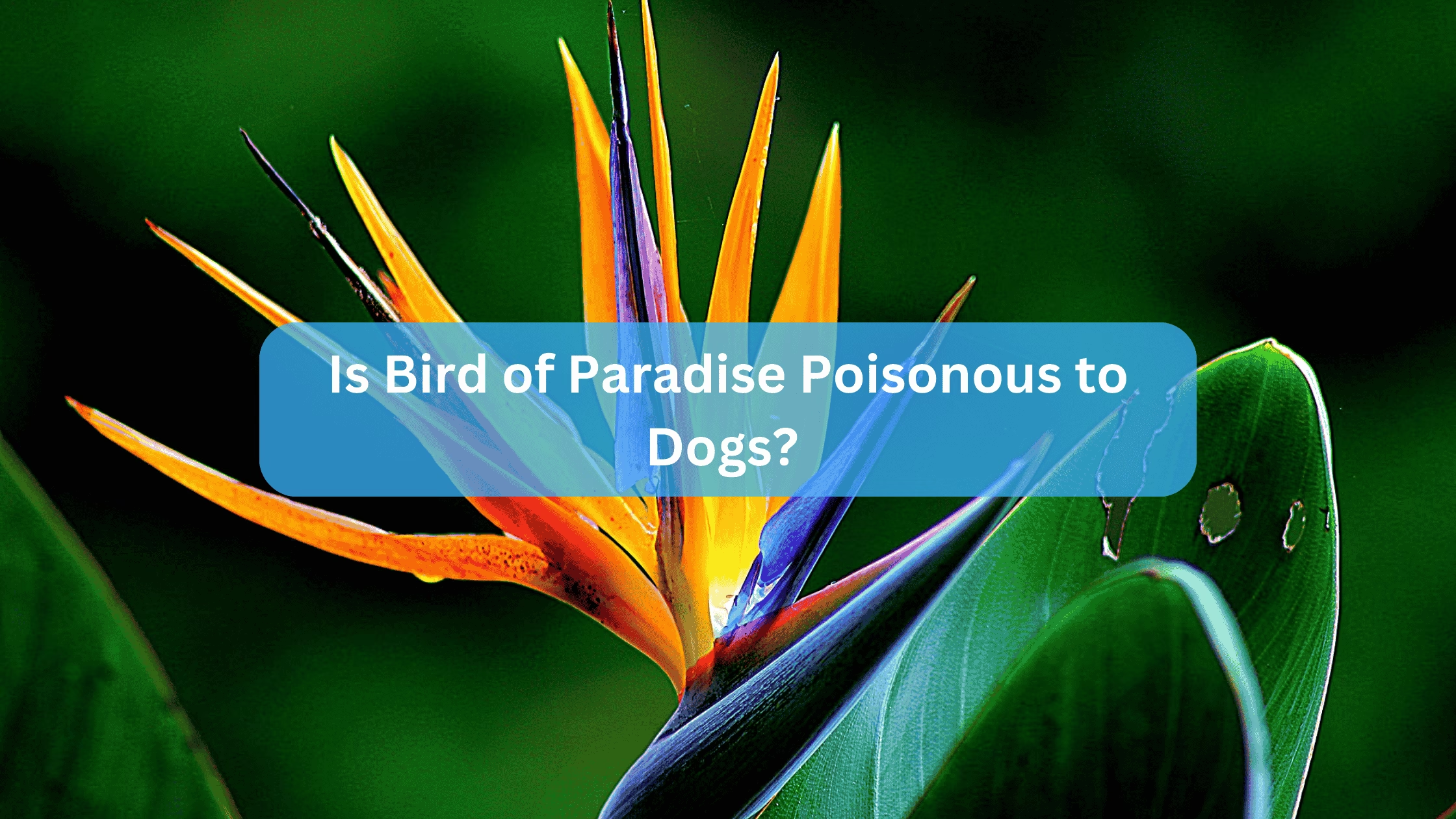The Bird of Paradise plant, known for its stunning appearance and vibrant flowers, is a popular choice among gardeners and homeowners. However, if you’re a dog owner, you might be wondering: Is Bird of Paradise poisonous to dogs? This guide aims to provide detailed information about the toxicity of this plant, its effects on dogs, and how to keep your furry friends safe.
Understanding the Toxicity of Bird of Paradise
Toxic Components
The Bird of Paradise plant (scientific name: Strelitzia reginae) contains several toxic compounds that can adversely affect dogs. The primary toxins include:
- Hydrocyanic Acid: Known for its ability to interfere with oxygen utilization in the body, hydrocyanic acid can cause severe health issues when ingested in significant amounts.
- Steroidal Alkaloids: These compounds can lead to gastrointestinal disturbances and neurological symptoms in dogs.
How Toxic is the Bird of Paradise?
The toxicity level is generally considered mild to moderate; however, it can still pose serious health risks if ingested.
Symptoms can range from mild gastrointestinal upset to severe neurological reactions depending on the amount consumed and the individual dog’s sensitivity.
Symptoms of Bird of Paradise Poisoning in Dogs
Recognizing the signs of poisoning is crucial for prompt treatment. Symptoms may appear within 20 minutes after ingestion and can include:
- Gastrointestinal Issues:
- Vomiting
- Diarrhea
- Nausea
- Drooling
- Neurological Symptoms:
- Ataxia (loss of coordination)
- Muscle tremors
- Increased heart rate
- Lethargy or weakness
If your dog exhibits any of these symptoms after being near a Bird of Paradise plant, it is essential to seek veterinary care immediately.
What To Do If Your Dog Eats Bird Of Paradise?
First Steps After Ingestion
If you suspect your dog has ingested part of a Bird of Paradise plant, follow these steps:
- Remove Plant Material: Carefully check your dog’s mouth for any remaining plant material and remove it if possible.
- Do Not Induce Vomiting: Unless instructed by a veterinarian, do not attempt to induce vomiting at home as this could cause further harm.
- Contact Your Veterinarian: Call your vet or a pet poison hotline for advice on what to do next.
Veterinary Interventions
When you arrive at the veterinary clinic, expect the following procedures:
- Physical Examination: The vet will perform a thorough examination to assess your dog’s condition.
- Diagnostic Tests: Blood tests may be conducted to evaluate organ function and determine the severity of poisoning.
- Treatment Options:
- Inducing vomiting (if appropriate)
- Administering activated charcoal to absorb toxins
- Providing IV fluids for dehydration
- Medications to control symptoms such as vomiting or diarrhea
Timely veterinary intervention is critical for recovery, so don’t delay seeking help.
Prevention Strategies for Dog Owners
Identifying and Managing Risks
To protect your dog from potential poisoning by Bird of Paradise plants, consider implementing these strategies:
- Recognize the Plant: Familiarize yourself with the appearance of the Bird of Paradise. Its distinctive paddle-shaped leaves and bright flowers make it easily identifiable.
- Create Barriers: Use fences or barriers around garden areas where these plants are located. For indoor plants, consider placing them on high shelves or using hanging baskets.
- Train Your Dog: Teach commands like “leave it” to discourage your dog from approaching potentially harmful plants. Positive reinforcement can help reinforce this behavior.
- Dog-Friendly Alternatives: Replace toxic plants with non-toxic options such as snapdragons or petunias. Consult resources like the ASPCA’s list of pet-safe plants for guidance.
- Regular Monitoring: Keep an eye on your dog when they are outside. Regularly patrol your yard for any signs that they may be trying to nibble on plants.
Creating a Safe Environment
Designate a specific area in your yard as a “dog-safe zone” filled with non-toxic plants and toys. This space allows your dog to enjoy outdoor time without the risk associated with toxic flora.
Frequently Asked Questions
Is all Bird of Paradise toxic to dogs?
Yes, all parts of the Bird of Paradise plant are considered potentially toxic to dogs, although symptoms may vary based on individual sensitivity and amount ingested.
What should I do if my dog ate a small amount?
Even if your dog only ingested a small amount, it’s best to contact your veterinarian immediately for advice. Some dogs may experience mild symptoms while others could have severe reactions.
Are there any non-toxic alternatives to Bird of Paradise?
Yes! Consider planting non-toxic options such as marigolds, nasturtiums, or sunflowers that are safe for dogs while still providing beautiful blooms in your garden.
How long does it take for symptoms to appear?
Symptoms can appear as quickly as 20 minutes after ingestion but may take longer depending on factors such as the amount consumed and individual metabolism.
Also Read: Can a Dog Get a Cat Pregnant? A Comprehensive Guide
Also Read: Can You Use Human Ear Drops on Dogs? A Comprehensive Guide
Conclusion: Is Bird of Paradise Poisonous to Dogs?
Understanding whether the Bird of Paradise is poisonous to dogs is crucial for any pet owner. While this beautiful plant can enhance your garden’s aesthetic appeal, its potential toxicity poses risks to your Dog that should not be ignored.
By recognizing the symptoms of poisoning, knowing how to respond in an emergency, and taking preventative measures, you can ensure that your furry friend remains safe while enjoying their environment.
Stay vigilant about what plants are accessible to your pets and educate yourself on safe gardening practices.
If you ever have doubts about a plant’s safety or your dog’s health after potential exposure, don’t hesitate to consult with a veterinarian. Your dog’s health and well-being should always come first!
Sources:
- https://www.aspca.org/pet-care/animal-poison-control/toxic-and-non-toxic-plants/bird-paradise
- https://www.petpoisonhelpline.com/poison/bird-of-paradise/







